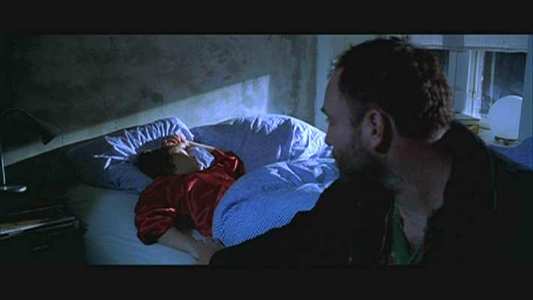Review of Bleeder
Introduction
After gritty Danish gangster pic ‘Pusher’, Nicholas Winding Refn opens up his canvas somewhat to take a look into the lives of a group of working men connected by a low rent video store. Although shot with considerably more finesses than the hand-held shaky-cam antics of ‘Pusher’, ‘Bleeder’ is even more dramatically anorexic. Sticking its snout in a plethora of modern concerns: domestic violence, racism, urban alienation, emasculation, yet delivering little in the way of insight.

Video
Surprisingly great. Elegant wide-angle photography, excellent piercing colour. Might just be my new DVD player, but this looks pretty sharp.

Audio
Nothing to shout about. Standard Dolby 2.0 dialogue track in Danish is not, unsurprisingly, a great deal of help.

Features
Disappointing. Some trailers for ‘Pusher’ and ‘Bleeder’, some basic (albeit up-to-date) filmographies and a stylish (though arbitrary) animated menu. Considering ‘Pusher’ generously provided an above average Making of Doc as well as a commentary, ‘Bleeder’s lowest common denominator approach to added value can’t help but provoke the Oliver Twist in me.

Conclusion
Man’s man Leo (Kim Bodnia) expresses ambivalent feelings when his girlfriend, Louise (Rikke Louise Andersson) reveals she is pregnant with their first child. She’s not the only thing pregnant orbiting around this film: video store geek Lenny (Mads Mikkelsen) does all he possibly can not to skewer sweet, lonely heart bookworm Lea (Liv Corfixen), during a lengthy series of anxious, constipated exchanges. So far, so Ken Loach. Things take a turn down a decidedly nastier path when an explosive argument between Leo and Louise turns violent and Louise looses the child. Her brother, racist, volatile Louis (Levino Jensen) schemes a despicable revenge.
Although it provides a certain tactile intensity, even suspense. Refn’s film is basically an assemblage of rather disjointed and irrelevant vignettes linked together by predictable narrative hooks and unimaginative storytelling. The result is shouty, hollow, brooding. Prettier and more visually arresting than the off-the-cuff vérite of ‘Pusher’ (maybe that’s part of the problem), ‘Bleeder’ lacks even that film’s rambling narrative strength, the story here split over half a dozen characters, none of whom are of great sympathy or interest.
Predictably, it all boils to a simmering, tragic conclusion with a pinch of possible redemption in the closing seconds. The performances, like ‘Pusher’ are variable: Mikkelsen pulls off a believably stoic performance as the alienated nerd locked in anti-social prison of his own making (a not exactly subtle substitute for Refn); Andersson and Corfixen deliver bland performances in typically simplistic and woefully underwritten female roles in what is a defiantly masculine picture. Bodnia, basically filing off the edges from his previous performance in ‘Pusher’ and recycling his ‘breakdown’ and ‘going postal’ histrionics makes for a convincing and compelling slow-burn. Unlike Bodnia’s Frankie in ‘Pusher’ however, Refn fails to provide the audience with even the faintest glimpse into Leo’s decision to reject his unborn child. For a character study, ‘Bleeder’ is heavy on silent, boiling resentment and ‘meaningful’ pauses, but light on top.
Semi-developed would be an understatement, particularly given the story’s bizarre obsession with violent B-Movies. Refn’s comment seems to be, in a world where the only connection to humanity is via the culture (specifically trash culture), men and women are seemingly unable to connect with one another, even, in the most natural of exchanges and commitments: the sharing of each other through a child. Leo, it seems, would rather quash his masculine impotence via the possession of a gun, than consummate his love for Louise. Does his despair at the thought of being the father to a child indicate a profound self-loathing? You won’t find any answers here. In its own way, ‘Bleeder’ sets itself up as a rather unconvincing tale of the decay of machismo. Its an idea that’s left p***ing in the wind, which can be said for the rest of the film, which dresses up its half-ideas with an impressive and often powerful cinematic style. Reasonably competent, but distressingly uninteresting second feature.
Your Opinions and Comments
Be the first to post a comment!